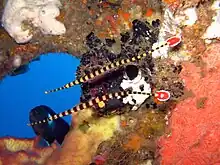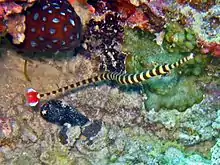| Banded pipefish | |
|---|---|
 | |
| Scientific classification | |
| Domain: | Eukaryota |
| Kingdom: | Animalia |
| Phylum: | Chordata |
| Class: | Actinopterygii |
| Order: | Syngnathiformes |
| Family: | Syngnathidae |
| Genus: | Dunckerocampus |
| Species: | D. dactyliophorus |
| Binomial name | |
| Dunckerocampus dactyliophorus (Bleeker, 1853) | |
| Synonyms[2] | |
| |
The banded pipefish or ringed pipefish (Dunckerocampus dactyliophorus) is a species of fish in the Syngnathidae (seahorses and pipefish) family.[3][2]
Distribution and habitat
The banded pipefish is widespread throughout the tropical waters of the Indo-Pacific region, Red Sea included.[2] Its range includes Australia, Fiji, French Polynesia, Indonesia, Japan, the Marshall Islands, New Caledonia, Northern Mariana Islands, Papua New Guinea, the Philippines, Samoa, the Solomon Islands, South Africa, and Taiwan.[1] It inhabits tide pools, lagoons, and outer reef slopes in tropical climates.[2]
Description
The banded pipefish has a straight, elongated body which reaches a maximum length of 19 cm (7.4 in).[2] It has fleshy streams coming back from its head. These trails are thought to be mechanisms of camouflage for the pipefish whilst hiding in reeds.[4]
 Banded pipefish
Banded pipefish.jpg.webp) Banded pipefish
Banded pipefish Skeleton of a banded pipefish (Museum of Osteology)
Skeleton of a banded pipefish (Museum of Osteology)
Reproduction
Similar to the other seahorses and pipefishes, the male banded pipefish is equipped with a specialised brood pouch, rather than the female.[5] The female deposits her eggs in the male's pouch, where they develop. The male later gives birth.[6]
References
- 1 2 Pollom, R. (2017) [errata version of 2016 assessment]. "Dunckerocampus dactyliophorus". IUCN Red List of Threatened Species. 2016: e.T6814A115083653. doi:10.2305/IUCN.UK.2016-3.RLTS.T6814A67621462.en.
- 1 2 3 4 5 Froese, Rainer; Pauly, Daniel (eds.) (2015). "Dunckerocampus dactyliophorus" in FishBase. October 2015 version.
- ↑ "Fish.gov.au". Archived from the original on 22 July 2008. Retrieved 10 July 2008.
- ↑ Günter Berghaus (2004). New Perspectives on Prehistoric Art. Greenwood Publishing Group. p. 42. ISBN 978-0-275-97813-6.
- ↑ Marshall Cavendish Corporation, ed. (2004). Encyclopedia of the Aquatic World. Marshall Cavendish. ISBN 978-0-7614-7418-0.
- ↑ Blasiola, George C.; Matthew M. Vriends (2000). The Saltwater Aquarium Handbook. Barron's Educational Series. ISBN 978-0-7641-1241-6.
